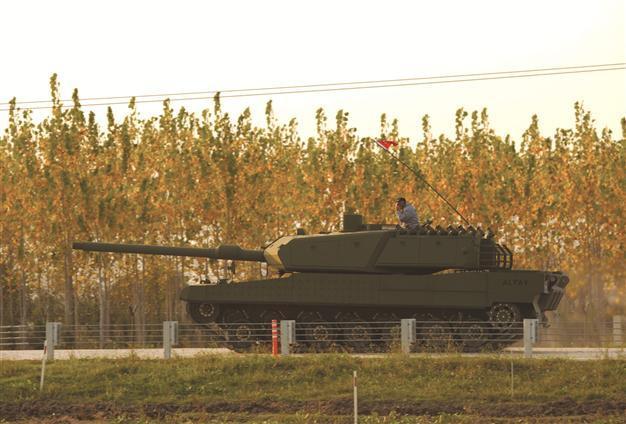Koç’s defense business a casualty of feud with government?
Burak BEKDİL

Koç’s armored vehicles maker, Otokar, has been working to produce four prototypes for the Altay, Turkey’s first national main battle tank, under a $500 million prototype contract. DAILY NEWS photo, Emrah GÜREL
It is not a secret that Turkey’s biggest industrial conglomerate, Koç Holding, has never been Prime Minister Recep Tayyip Erdoğan’s favorite business group. Its owners are too little conservative and are often portrayed as the “Istanbul elite,” as opposed to Erdoğan’s preferred conservative businesses from the Anatolian heartland.
But facts are facts. Koç Holding owns the country’s only refinery, along with joint ventures with international carmakers Ford and Fiat and a number of other manufacturing powerhouses. The group provides 9 percent of the country’s GDP, 10 percent of its exports and 9 percent of its tax revenues.
The first major public tension between Koç and Erdoğan’s government emerged this summer. In one incident during month-long demonstrations in June, protesters tried to escape police tear gas and pepper spray by taking refuge in a posh Istanbul hotel, Divan, owned by Koç. Hotel management admitted the protesters to its lobby, which quickly turned into a makeshift first aid room.
The police fired more tear gas and pepper spray into the hotel lobby although it is illegal to fire these chemicals into indoor spaces. It was reported that Ali Koç, a board member and third generation family member, had ordered the hotel to help the protesters.
PM drops a hint to Koç On June 16, an angry Erdoğan said in a public rally: “We know which hotel owners helped terrorists [protesters]. It is a crime to abet terrorists. And those crimes will not remain unpunished.”
Shortly after that brawl, tax police raided Koç’s refinery subsidiary, Tüpraş. Officials said it was a regular inspection. But on Sept. 26 the government’s executive committee that oversees defense procurement scrapped a $2 billion deal with Koç’s shipyards, RMK Marine, pledging new competition.
This is a program (MILGEM) for the eventual construction of eight corvettes (corvettes are the smallest warships in the Turkish Navy). In January, RMK Marine signed the contract for six vessels.
Would the other multi-billion dollar Koç defense business with the government, this time for the production of Turkey’s first national main battle tank, the Altay, become a casualty too?
Some defense industry sources insist that the decision over MILGEM was political. “The government crackdown is very visible here,” said one source.
But defense officials deny there is any political link here. Murad Bayar, Turkey’s top defense procurement official, told U.S. weekly Defense News that one Istanbul shipyard filed a complaint that the earlier two-way contest which RMK Marine won had violated competition rules. Bayar’s Undersecretariat for Defense Industries (SSM) had invited two companies to the MILGEM competition, RMK Marine and Dearsan, although a 2007 Strategic Sector Document issued by SSM had named seven shipyards as potential bidders in Turkish naval programs.
The timing of the probe into the contest supports Bayar’s view. The Prime Ministry’s Inspection Board found the complaint about the tender accurate and advised for the cancellation of the contract with RMK Marine in April or May, some time before the Gezi protests took off.
“This has caused us a loss of one year in progressing with this program,” Bayar said. “Now we will invite all seven to a new competition.”
Koç’s serial production not guaranteeWhat about the Altay? Koç’s armored vehicles maker, Otokar, has been working hard to produce four prototypes for the Altay under a $500 million “prototype contract” but this deal does not mean the company also has a contract for the serial production worth billions of dollars.
For Koç, things look better here. Top defense officials say that they would prefer the prototype-maker for the serial production contract “although selecting another manufacturer is technically and legally possible.”
One source said: “Changing the producer after the prototype-maker has gained so much experience does not make sense. But we may expand the producing group and involve other partners too.” k HDN
